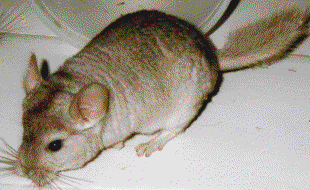![]()

Pellets:
Pellets are the base of the chinchilla diet. Most chinchillas are fed chinchilla pellets, guinea pig pellets, or a high quality rabbit feed, all of which can be found at a pet or feed store. When starting out chinchilla pellets are probably your best bet. Mazuri is a good brand, as is Sunseed (though you may want too remove the raisins and banana bits and save them as special treats, not as part of the meal).
Feed your chin at the same time each day (evening is the best time). Place an ample amount of pellets (usually the amount your chin will eat in 24 hours without, it will take some trial and error to determine the exact amount) in a chew-proof bowl (a heavy crockery bowl works well). Keep the bowl clean and keep the pellets out of reach of rodents and insects. Pellets lose many of their nutrients after 30 days so it is a good idea to not buy more than a month's supply of feed at a time.
Hay:
Hay is an important part of a chin's diet and it also gives them something to chew on. Alfalfa and timothy are the most widely used chinchilla hays. Alfalfa can be fed loose or as compressed cubes. The cubes save time, mess, and space and help to wear down chin teeth, but chins enjoy loose hay alot more and it keeps them busy. If you can find timothy hay use it instead of alfalfa because the main ingredient of pellets is alfalfa hay; using timothy adds variety to their diet. If you use loose hay try and find a first or second cutting of high quality dairy or horse hay. Never use dusty or moldy hay. Loose hay can be fed by using a hay rack (available at most pet stores) or by setting it on top of the cage (if chins have easy access to the top of their cage). If the hay gets urinated on, remove it.
Treats:
Chinchillas love treats. Raisins and other dried fruits make great treats. Dry cereal, a small piece of fresh fruit, or dry bread can also be used. The key is moderation (1-2 raisins/ day max). Too many treats will upset your chin's GI tract. Don't give your chins fresh fruits and veggies like you do rabbits and guinea pigs.
Water:
Water should be changed on a daily basis and the bottle should be kept clean. The bottle needs to be protected from chinnie teeth. Either use a glass bottle or get a metal water bottle guard.